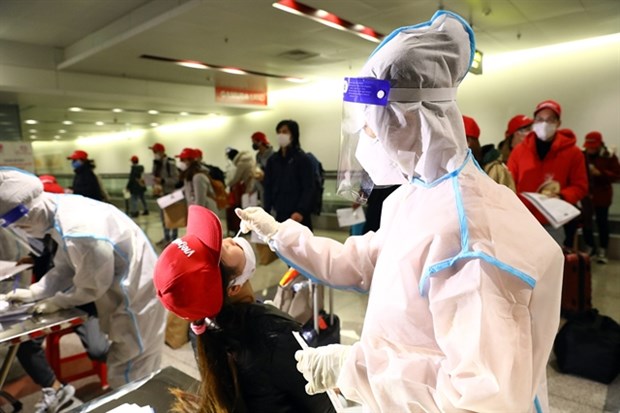Aviation authority proposes to scrap rapid testing in favour of RT-PCR
The Civil Aviation Authority of Viet Nam (CAAV) wants arriving passengers tested for SARS-CoV-2 following the RT-PCR method prior to their flight, removing the additional need for rapid testing as well.
 |
| A passenger from Tokyo tested for SARS-CoV-2 at Noi Bai International Airport in Hanoi. (Photo: VNA) |
They say the proposal is in line with common practice around the world.
Only last week, the CAAV wanted passengers to take both tests, but now they are happy with allowing people to fly, as long as they have a negative RT-PCR test.
The suggestion was presented in the CAAV’s report to the Ministry of Transport on the initial resumption of regular international flights in Viet Nam, which started from January 1.
CAAV Deputy Director Dinh Viet Son said that the authority has been receiving feedback from Vietnamese and international airlines on rapid testing requirements before and after boarding the plane, testing fee collection, and health declarations.
In particular, the procedure says that airlines collect rapid testing fees along with the airfares, then send the payment to testing units.
Cathay Pacific and Turkish Airlines have suggested that Tan Son Nhat International Airport in HCM City set up collection points or an online gateway for testing fee payments like other airports, as the airlines cannot assist with this process.
Meanwhile, Singapore Airlines observed that there still lacks comprehensive and detailed instructions on the rapid testing procedure and fee collection. The airline said that an online payment service will allow incoming arrivals to pay the testing fee before their flights, which has been common practice around the world.
Bamboo Airways also noted that the rapid testing procedure after the flight often lasts around three hours, while Viet Nam’s Health Ministry still requires valid RT-PCR test results during check-in.
Passengers have been complaining that multiple tests increase the costs, and asked whether they could perform at-home quick tests or must go to the designated testing points at the airport.
Vietjet Air also said that following the current regulations, passengers have to submit the entry declaration on the website IGOVN, the health declaration on the PC-COVID application, and possibly another locally-required form, an example being HCM City and its website www.antoan-covid.tphcm.gov.vn.
Therefore, the airline recommended that one single form be used to submit the required declarations. It also shares the same opinion as other airlines on scraping rapid testing requirements in favour of valid RT-PCR test results.
Air carriers also suggest that based on the flight schedule, airports should work with testing units to ensure a sufficient number of testing points and medical workers to avoid congestion when there are more flights coming in.
On this basis, the CAAV proposed to only require RT-PCR test results. This practice has long been adopted by other countries, even during the emergence of the Delta variant.
In the case where rapid testing is still required, the CAAV suggested that fees should be collected on the spot at the testing points, and international aircrews are tested only once upon arrival while waiting for their returning flight (at the airport or at quarantine accommodation).
Source: VNA